
Civil Engineering Construction- Residential Tower
February 27, 2021
Managing Across Cultures Assessment
February 27, 2021General Foundations of Legal System
No. | Questions | British Law | Kazakhstan Law |
1. | What is the origin of the legal system? | The British law was formulated through a system of judicial decisions based on legal precedents and the notion of stare decisis. | The Kazakhstan law was influenced by the Islamic principles and the Romanian law. |
2. | What is the legal form of government? | The British government is governed by the Parliament that takes directions from the Queen of England. | Presidential form of government promulgated through the constitution id prevalent |
3. | How can law be enforced? | Civilians can file a complaint against another civilian or an organization if they believe a civil wrong has been committed against them. | The current legal system of enforcement is operational through three facets: the courts, prison system and the police. |
4. | What are the constituents of law? | British law comprises of European Union law, Statutory law, common law and customary law. | Based on the Romanian law, it finds its constituents in socialist principles (Kembayev and Burke 2010). |
5. | What is the highest form of Appellate court? | House of Lords. | Supreme Court. |
6. | What is the hierarchy of the legal system? | In case of a conflict, statutory law gains precedence over common law, otherwise common law precedents are followed. | Statutory law gains precedence over common law, otherwise supreme court decisions are followed. |
7. | Does the country have a ratified constitution? | The British legal system does not have any ratified constitution. | The constitution of Kazakhstan was approved and ratified in 1995 (Kembayev and Burke 2010). |
8. | What are the external influences on law? | European Union law has been a major persuasive authority within the United Kingdom apart from customary law. | Kazakhstan being a member of the ILO has ratified all the fundamental conventions and all are in force. Islamic principles of law are persuasive sources. |
9. | Does the law protect basic fundamental human rights? | British law, despite the absence of a constitution has implemented the European Convention on Human Rights with strict adherence. | The Constitution of Kazakhstan lays down various provisions of fundamental human rights. |
10. | Are there any barriers to law enforcement? | Prima facie there seem to be no barriers to law enforcement except for lack of awareness since civilians have the right to promulgate court proceedings for any wrong. | Various factors place barriers: lack of awareness, corruption, and structural bias in legal system. |
The basic foundations of legal system in both the aforementioned countries differ greatly. Where Britain has no written constitution but has a wide array of developed principles of all facets of law, Kazakhstan has a written constitution based on Romanian principles, but the legal principles are yet to be developed. The barriers to access to justice observed are primarily accounted to for the structural bias and the lack of awareness on the part of the residents (Kembayev and Burke 2010). Furthermore, the legal forms of government differ to the basic roots. However it is imperative to point out that both the countries show considerable influence exerted through extrinsic treaties and organizations which have helped shape up their country’s legal foundations. Both the laws provide protection against the basic fundamental rights to the residents, however the United Kingdom through European convention have an enhanced implementation system. The law implementation system in the UK, justice delivery and rule of law is considered to be one of the best in the World, however for Kazakhstan there are many challenges which the justice system faces in this regard. Provision of the laws and protection system in place is not sufficient unless these are correctly applied. Justice system must be able to be applied fairly, and the correct procedure applications which have been developed in accordance with the Kazakhstan’s constitution is yet to be recognized internationally.
Laws applying to Professional Engineers.
No. | Questions | British Law | Kazakhstan Law |
1. | Who is deemed to be a professional engineer? | A professional engineer is a chartered engineer registered with the Engineering Council. | A person with accredited engineering degree. |
2. | Is there any regulating body for professional engineers? | Engineering Council United Kingdom. | Kazakh Engineering Society. |
3. | Is there a requirement for a license to be a professional engineer? | Yes. License and registration with the Engineering Council of UK. | No. There is n requirement of a license only registration with the Kazakh Engineering Society. |
4. | How can one become a professional engineer? | A four years bachelors followed by an accredited Masters degree, with a total of five years. | Through accredited bachelors degree. |
5. | What law protects professional engineers? | Engineering Council Royal Charter. | There is no law protecting professional engineers. |
6. | Can a professional engineer register to any other organizations in foreign jurisdictions? | A professional engineer can register at the European Federation of National Engineering Association. | A professional engineer can register at the World Federation of Engineering Societies. |
7. | What are the levels of wages under law for a professional engineer? | A registered professional engineer can earn between 43000 pounds to 55000 pounds (Russo British, 2012). | There is no specific law on the levels of wages under law for a professional engineer |
8. | Do professional engineers hold any tortuous liability? | Yes. The law of tort is greatly developed within the United Kingdom and therefore professional engineers can be held liable (Chapman, 2002). | There is no specific law on tortuous liability owed by engineers. |
9. | What are the limits of enforceability against professional engineers? | No contracts or liability can be enforced for work undertaken by professional engineers for an illegal work. | There is no specific law on enforceability or limits therein against professional engineers. |
10. | What are the health and safety regulations with regard to professional engineers? | There are no specific regulations on health and safety of professional engineers or either any regulations on health and safety owed towards consumers by professional engineers (Russo British, 2013). | Professional engineers do not specifically owe a duty to ensure health and safety, but it may governed by the Civil Code of Republic of Kazakhstan. |
As with the legal foundations of law, the laws that apply to professional engineers vary at greater lengths. Again, the reason for such disparity is that where United Kingdom has already developed their system of laws with almost every aspect, the legal principles found within Kazakhstan are still in the stage of developed. Both countries recognize engineers to have accredited degrees, but where United Kingdom requires a licensed registration, Kazakh law requires registration within the Kazakh Engineers Society. The United Kingdom has developed engineering societies which are licensed to train the engineers, conduct tests and grant memberships. The procedure developments and accreditation is in accordance with UK lay, and accepted by all the service societies of the country. The engineers are paid in accordance with the relevant status of chartership, such as junior engineers and senior engineers are categorised on the basis of the experience and the quality of field and/or research work conducted
Furthermore, unlike United Kingdom’s law, Kazakh law does not make any reference to specific tortuous liability that may be owed by the professional engineer in the course of their work. Furthermore, there is no distinction within the Kazakh law with regard to engineers and any other contracting individuals which can lead to an overlap of liabilities and unclear boundaries. Furthermore, where United Kingdom’s law places restrictions of enforceability of contract or liability in illegal or such works, it is pointed out that the Kazakh law, does not include any limit to such enforceability, therefore at the discretion of the court it may be accorded accordingly.
Contract Law.
No. | Questions | British Law | Kazakhstan Law |
1. | What are the origins of contract law? | British contract law is based on the European Union law of contract. | Formulated through the evolution of legal doctrine. |
2. | Is there a branch of contractual law in the country? | Yes. Contract law is a whole branch of regulations and policies. | There is no branch of contractual law in Kazakhstan. It operates as a part of the civil law. |
3. | What is the most important part of a contract? | Consideration. Even though it is an additional requirement, most cases come down to whether consideration is provided in an agreement. | There is no requirement of exchange of promises or consideration. |
4. | Does the concept of promissory estoppels have any enforcement? | Yes. Promissory estoppels are widely applied in appropriate cases at the discretion of the court. | No. Without consideration, there is no practicable doctrine of promissory estoppels. |
5. | What are the different types of contracts? | Unilateral, Bilateral, multilateral. All types require consideration. | Unilateral, bilateral, multilateral, consensual, real, oral, compulsory, free, onerous, and principle (Kershaw, 2002). |
6. | What law governs contracts? | Unfair Contract Terms Act 1977. Unfair Contract Terms and Consumer Regulations | Civil Code of Republic of Kazakhstan. |
7. | How can a contract be formed between companies in these two countries? | The British legal system uses the domestic law on contracts, Unfair Contract Terms Act and Unfair Contract Terms and Consumer Regulations to enforce and implement contractual agreements between domestic and foreign jurisdictions. | Kazakhstan’s legal system is very immature. Their laws are mostly borrowed from the foreign jurisdiction where they intend to enter into partnership. Recently, they have formed a British Kazakh Law Association to facilitate corporation in both countries. |
8. | What is freedom of contract? | A principle of public policy to allow people to enter into contracts when and how they please. | It is a supplementary procedure whereby the parties are allowed to conclude a contract already provided for. |
9. | How important is privy of contract? | Privy of contract is extremely important in British contract law, no proceedings can be undertaken without privy. | Arbitration can be conducted without parties’ privy to contract. |
10. | What are the remedies for breach of contract? | Repudiation, Damages. | Only restitution is available: bilateral restitution, no restitution and unilateral restitution. |
To begin with, Kazakh law does not have a separate branch for law of contracts and is governed by the Civil Code of Republic of Kazakhstan, whereby United Kingdom has developed the law of contract to an extent that it has various statutes primarily on consumer regulations and unfair terms governing the agreements. The pre requisites to the formation of contract are fairly similar, with an offer and an acceptance, however, consideration, which is an inherent component of contractual agreements within United Kingdom, has a minute role in Kazakh law, limited to only onerous type of agreement. All other agreements within the Kazakh law are not required to have any exchange of promise or otherwise consideration. Furthermore, where freedom of contract is a principle widely applied within United Kingdom, it is a mere supplementary principle within the Kazakh law placing it at a very low priority, thereby giving rise to a monotonous monopoly within the agreement and contractual culture. Lastly, the difference instituted with regards to breach of a contract is interesting, since where United Kingdom law provides damages and repudiation; the Kazakh law only recognizes restitution as a proper means of remedying the parties (Kershaw, 2002).
Intellectual Property Law.
No. | Questions | British Law | Kazakhstan Law |
1. | What is intellectual property? | Intellectual property is termed to be an idea or an expression. | Comprises of inventions and ideas which have tangible components. |
2. | What is covered under intellectual property? | Anything virtually made by an idea including an invention, a design, a song. | Any inventions or logos (Delloitte, 2010). |
3. | What are the different types of intellectual property? | Patents, Trademarks, Designs and Copyrights (Martin et al, 2007). | Patent and Trademarks. |
4. | Is there any other way of protecting intellectual property? | Companies House, Copy protection devices, Database right, publication right, trade secrets. | Through a license agreement. |
5. | Which is the most effective way of protecting intellectual property? | For an invention patent is required. For e logo, design is required. For a sign, trademarks are required. For a written or an audio copyright is required. | Through a patent or a trademark. |
6. | What is the punishment for Intellectual Property infringement? | In Magistrates Court: A 6 months imprisonment and/or a 5000 pounds fine. In Crown Court: A maximum sentence of 10 years and/or fine of 25000 pounds (Greenhaulgh and Martin, 2010). | Discretionary power to the courts (Bishkek, 2011). |
7. | What law governs the intellectual property rights un UK? | Patent and Designs Act 1907. | There is no law on intellectual property; they are dealt with as a part of the Civil Code of Republic of Kazakhstan (Delloitte, 2010). |
8. | What is intellectual property crime? | Defined as a willful infringement of intellectual property rights and is tri able as a cyber crime (Martin et al, 2007). | A willful infringement of personal rights. |
9. | Can foreigners register intellectual property? | Foreigners cannot per se register intellectual property, unless their computer IP address is UK based. | Yes, through a registered patent/trademark attorney hired by the foreigners. |
10. | How can intellectual property be enforced? | It is a right protection through government agencies; therefore, it can be enforced through Intellectual Property Office United Kingdom, the civil and the criminal courts. | Only as a civil wrong through the civil courts. |
Interestingly, the Kazakh law does not recognize intellectual property rights beyond patents and trademarks unlike United Kingdom which includes copyright and design in the aforementioned category. Again, the reason accounted for such lack of recognition is the lack of developed legal system and subsequent principles. Another reason or this could be the lack of business applications with respects the intellectual property rights. A positive aspect though is that United Kingdom does not normally allow foreigners to register intellectual property within their jurisdiction, but Kazakh does, if it is done through a proper registered agent. This may be an attractive factor for the foreign investors who can come in and get their ideas registered, invest in the local business to groom the economical system of the country, but on the other may hand may also ensue fraud. Similarly, where United Kingdom only allows registration if the IP address is based within UK, this may lead to over simplification of the procedure and abuse of the same. In higher probability, intellectual property crimes are dealt within the sphere of a cyber crime and therefore instituted within a criminal court, whereas, in Kazakh law, it can only be dealt under the Civil Code through the civil courts at the discretion of the judiciary.
Employment Law.
No. | Questions | British Law | Kazakhstan Law |
1. | What is employment law? | Revolves around the legal relationship between employers, workers and unions. | Aims at protection of rights and interests of parties in labor relations. |
2. | What is the statute governing employment law in the country? | - National Minimum Wage Act 1998. - Working time Regulations 1998. - Employment Rights Act 1996. - Pensions Act 2004. - Trade Union and Labor Relations (Consolidation) Act 1992. | Labor Code of Republic of Kazakhstan. |
3. | Is there provision against discrimination in employment? | The Factory Act 1802 lays down various provisions on equality and morally acceptable principles to govern employment relations. | Article 4 of the Labor Code prohibits discrimination and child labor (Baker and Mckenzie, 2009). |
4. | Who is protected under labor law? | Employers, Workers and Trade unions. | Applies specifically employers and employees. |
5. | Is the employer required to take into account the employees opinions? | No. There is no legal obligation to do so. | The employer is required to form a commission on the opinion for the employee and submit a report in three working days. |
6. | Are there any restrictions on the conclusion of employment contract? | Employment Rights Act 1996, lays down provisions for wrongful and unfair dismissal. | - Child labor not allowed for children under 18 years of age. - Stateless people shall not be wrongfully dismissed. - Health will not be consideration for dismissal. (Baker and Mckenzie, 2009) |
7. | Is there any distinction between employment and other kinds of contracts? | There are specific distinctions between employees, independent contractors and temporary workers with each having their own specific policies and regulations. | Three features distinguish employment from other contracts: performance of labor organizations, wages, and qualifications. |
8. | Are there any provisions for health and safety of employees? | Yes. All contractual agreements include specific health and safety guidelines and policies. | There are provisions for work to be undertaken or transferred for health reasons, but there is no provision of ensuring health and safety at work. |
9. | Is positive discrimination allowed in employment? | Yes. Various provisions on giving preferential treatment to minority groups and in certain cases women. | No discrimination. Does not make any reference to positive discrimination. |
10. | Is harassment under employment treated as a specific crime or a generic one? | It is specifically dealt with the Equality Act 2010 and the Protection from Harassment Act 1997. | There are no specific provisions on harassment; however they may be dealt within the notion of discrimination (Baker and McKenzie, 2009). |
Interestingly, the law on employment is observed to be the most developed branch of law within the Kazakh system, which can be attributed to the implementation of the Labour Code of Republic of Kazakhstan, taken from the International Labour Organization. However, regardless, the law in United Kingdom, is far developed and encompassing then the law in Kazakhstan. Where the British law encompasses the notion of harassment at work place as a pertinent issue to be undertaken under specific statute, the Kazakh laws make no specific reference, and therefore may only be dealt within the notion of discrimination (Edwing and Hendy, 2010). Furthermore, even though countries prohibit child labour and discrimination, it is noted that United Kingdom has recognized the basic rights of the minorities present therein, be it ethnic minorities or women for that matter, and allows for positive discrimination in various facets of employment. Various human rights agencies and teams play a key role not only in directing and developing of laws which are considered to be more humane in the UK, but also worldwide. A positive aspect that may have a far reaching effect in the Kazakh law illustrates the equality and teamwork notion, whereby the employer is required to take into account the opinion of the employee through perhaps a commission and later a report, but this shows that a system for ensuring employee loyalty and motivation is in place.
- Baker and Mckenzie. Doing business in Kazakhstan. Employment in Kazakhstan. 2009.
- Baker and Mckenzie. Intellectual Property in Kazakhstan. Doing business in Kazakhstan. 2009.
- Bishkek, C. Intellectual property rights in the republic of Kazakhstan. Sub regional conference on the valuation and enforcement of intellectual property. 2011.
- Bolotov, Y. Intellectual property in Kazakhstan. 2008. Available at: http://www.chinalawandpractice.com/Article/1886196/Channel/7576/Intellectual-Property-In-Kazakhstan.html.
- Chapman, R. "The Human Rights Implications of Intellectual Property Protection". Journal of International Economic Law 5 (4): 861–882. doi:1093/jiel/5.4.861. 2002.
- Kershaw, D. 'No End in Sight for the History of Corporate Law: The Case of Employee Participation in Corporate Governance' (2002) 2 Journal of Corporate Law Studies 34.
- How do to business in Kazakhstan. 2012. Available at: www.deloitte.com/...Kazakhstan/.../Doing%20business%20in%20KZ_20.
- Greenhalgh, C. & Rogers M. 2010. The Nature and Role of Intellectual Property. Innovation, Intellectual Property, and Economic Growth. New Jersey: Princeton University Press. (p. 32–34).
- Ewing,K and Hendy, QC, 'The Dramatic Implications of Demir and Baykara .2010 39(1) ILJ 2.
- Kembayev, Z. And Burke, J. Legal Obligations in Kazakhstan. 2010.
- Martin G, Sorenson C and Faunce TA. 2007. Editorial: Balancing the need to protect the intellectual property rights (IPRs). Globalization and Health 2007, 3:4.
- Royal Academy of Engineering. Lloyds Register. Engineering Ethics: Do engineers owe duties to the public? Kings College London. 2011.
- Russo British, Chamber of Commerce. Job Market Overview and Salary Survey. Job Market Overview and Salary Survey 2012-2013. 2013.
Get 3+ Free Dissertation Topics within 24 hours?

























